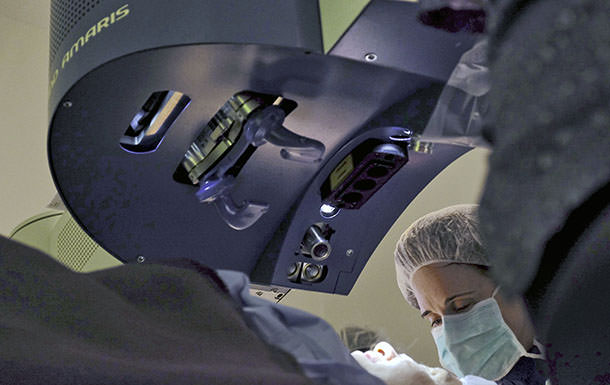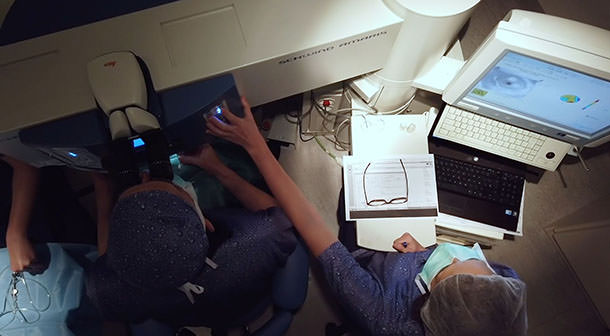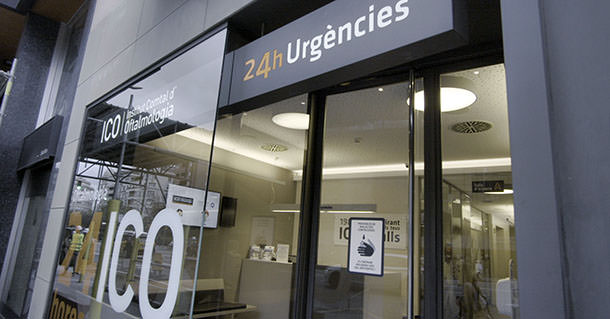5 good reasons for undergoing surgery to correct high myopia at VERTE
Many patients use the Internet to find out about the different centres and techniques that can help them get rid of their glasses or contact lenses.
The decisions you make about where and who to ask to do your eye surgery are crucial and such decisions can be a cause for great concern and difficulty for some people.
These are the main reasons why we believe VERTE's Refractive Surgery Unit should be your first choice for this important decision.
1. The Amaris Laser

The most advanced laser, highly regarded by the scientific community and given a better rating by patients. The Amaris laser is currently the ophthalmic surgical instrument with the highest intrinsic value. It is responsible for delivering perfectly dosed and adjusted energy pulses onto the corneal tissue point-by-point for each of the millions of pulses required to change curvature and correct dioptric power.
A guarantee that the laser will follow the eye, no matter how your eye moves during the treatment, is fundamental as such movements are involuntary. Knowing that the treatment is going to track the centre of the eye during the operation reassures patients when entering the operating theatre. The huge reduction in operating time is major progress; the 3 or 4 minutes it takes just fly past. The phrase we hear most in the operating theatre after completing a patient's operation is almost always the same: Is that it?
Personalised topography-guided treatment is another key feature.
2. The Surgical Team

The surgeon (Dr David Andreu) prepares the eye so that everything runs smoothly. He creates the corneal flap using the Pendular Microkeratome, a simple, precise and extremely safe instrument. The surgeon centres and focuses the laser. After the procedure, he replaces the flap and makes sure that the cornea looks almost as if it had never been touched, without using sutures.
The laser does not operate itself. The technician (optometrist Virginia Andreu) programmes the laser for each treatment and performs all the necessary calibrations and protocols required for laser quality control. The precision and safety of the laser are in her hands.
All the other instruments do not simply float into the surgeon's hands. The instrument (scrub) nurse (Marta Porté) holds and places the microsurgical instruments in his hands and makes sure the microkeratome is working properly. She also guarantees something else that is vital for all surgery: sterility.
This surgical team has been working together continually on in VERTE's Excimer Laser cases since 2001.
3. The Diagnostic Team
Refractive surgery requires a very detailed study of each patient. The reason for the operation and the lifestyle of each individual must be clearly defined. There are many measurements that affect the decision and the laser's programming: optical power, the role of accommodation (which is why we also use eye drops that dilate the pupil), corneal curvature values, corneal thickness in microns, pupil diameter. All of these measurements are numbers that need to be handled with expert judgment.
“The laser's accuracy depends on the accuracy of these measurements”.
The team also needs to know when to indicate other techniques, such as ICL-type intraocular lens implantation or crystalline lens surgery in cases where the laser is not the best option.
Optometrist Montse Ortiz, as the person in charge of Clinical Optometry, has been working with the team since the beginning and shares the responsibility of studying and managing patients with Dr Osvaldo Guevara. Optometrists Anna Medina, Eva López and Carmen Aleson perform all the optometry studies of the Refractive Surgery Unit.
4. The A&E Department and the Multidisciplinary Team

Even though refractive surgery is extremely safe, it is not free from problems during the post-operative period. Having our own emergency team that is fully acquainted with these procedures and that can access all of a patient's personal information and medical records in seconds is a huge advantage. As a result of having a permanent A&E Department since 1989, VERTE has always had this advantage for all operations performed by all our surgeons.
Refractive surgery must not focus only on the cornea or crystalline lens. The eye is an integrated system that needs an integrated team of specialists. Any previous or subsequent problem affecting the retina or associated with any type of glaucoma or requiring an oculoplastic or neuro-ophthalmic study has the benefit of highly-qualified Specialised Units.
5. Ethical Responsibility
Refractive surgery at VERTE has been performed since the institution's beginning in compliance with strict ethical principles. Only those cases that meet all the required safety criteria are put forward for surgery. All the limitations recommended by scientific advances are strictly followed. Top-quality surgical materials are used for each patient. All special cases are discussed at clinical case meetings so that the whole team can help find the best solution.
Committed to the highest ethical guidelines for every person who places their trust in our ophthalmic team, and, even more fundamental: maximum information and communication throughout the process.